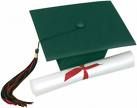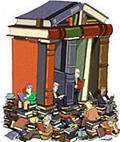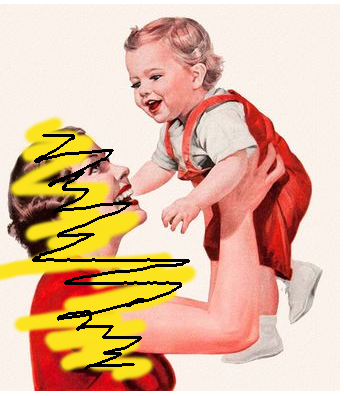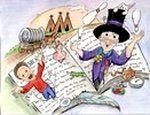Blog Home ▼

 A book club member emailed me the other day to say she found a certain book's Discussion Questions just TOO HARD. So I took a look. She was right—you need a Ph.D. to answer them...in fact, a whole damn village of Ph.Ds.
A book club member emailed me the other day to say she found a certain book's Discussion Questions just TOO HARD. So I took a look. She was right—you need a Ph.D. to answer them...in fact, a whole damn village of Ph.Ds.
What to do? Well, I decided to replace the publisher-issued questions with my own set and sent them off to her. Fortunately, that seemed to do the trick.
The whole incident brings up a point—a book's Discussions Questions can feel more like a pop quiz than a discussion starter for book clubs. They're often more threatening than helpful.
So...what do you do if you want a good discussion? Try taking a look at our other LitLovers Discussion Resources. While they're not specific to a particular title, they can help you get to the meat of a book—either fiction or nonfiction. They're more helpful than scary.
Discussion help from LitLovers
- How to Discuss a Book
- Generic Disucssion Questions for Fiction and for Nonfiction
- Read-Think-Talk (a guided reading chart)
- LitCourse—our 10 free courses are short and fun
 I did a post recently on the pleasures of re-reading. I want to add an addendum to that post (original post, June 21, 2009).
I did a post recently on the pleasures of re-reading. I want to add an addendum to that post (original post, June 21, 2009).
My friend, Randy Minnich, is a great re-reader…maybe obsessively so. See what you think—he’s read Tolkein’s Lord of the Rings series . . . 20 times. Actually, more like 22.
Of course, you’re wondering about the movie. What did he think of Peter Smith’s adaptation? Couldn’t sit through it. It would have ruined an entire world of his private imagining, he told me.
But wait… there’s more! Randy’s also read Patrick O’Brian’s Master and Commander series, all 24 volumes . . . get this: 8 times. (If you’re doing the math, it’s 192 books .) Like Tolkein, this was done over a period of decades.
Anyone top that? Randy was a research chemist. Does that explain it? (Nah…don’t think.)
 Janet is one of those wonderful occurrences of the 21st century—an internet friend. Her blog, Riehl Life, continually demonstrates a love of life’s gifts. And Janet has a gift of her own: a talent for poetry and ear for music.
Janet is one of those wonderful occurrences of the 21st century—an internet friend. Her blog, Riehl Life, continually demonstrates a love of life’s gifts. And Janet has a gift of her own: a talent for poetry and ear for music.
I’ve invited Janet here to talk about the two projects in The Sightlines Collection: her book Sightlines: a Poet’s Diary and now a new CD, Sightlines: A Family Love Story in Poetry and Music, which brings in music by her 93-year-old father along with his family stories and banter at the recording session in his parlor.
So here’s Janet—
Molly: Janet, tell us what inspired you to produce The Sightlines Collection.
Janet: It covered a three-and-a-half year period. After my sister died in a car crash in August 2004, I began commuting from Northern California back to SW Illinois to our family homeplace. My father and I cared for my mother there. It was a hard time. But, out of the truth I found there, I wrote Sightlines: A Poet’s Diary.
My birthday is at the end of the year. I went into a small retreat where I received a clear leading that I needed to listen to the truth and meaning of this period in my life…and write a book to help others. When I returned to my parents’ place after this, I began the book. It flowed out in the form of story poems. This was an easy and effective way to tell my story. This form also provided a good way to make the story accessible, even to readers who weren’t keen on poetry.
After its publication, I gave talks and workshops in the Midwest and West to get the word out. Folks told me that hearing me read these poems added so much meaning to them. Several people suggested that I record them. I’d had this in mind for several years, but didn’t know how to proceed. In Spring 2008 I’d planned to visit two of my closest blogging buddies in Nashville. Suddenly, it occurred to me that the time had come for me to make the audio book.
Indeed, it had! One of my buddies—Yvonne Perry—suggested Scott Kidd, her son-in-law as my sound engineer. Suddenly, we were on the way. The music was recorded in my father’s parlor, and I recorded the 90 poems in Scott’s home studio. It took us eight months to produce, but moved smoothly the whole way.
Molly: Any tips for our book club members?
Janet: Yes. When preparing for the book club, use the Sightlines Collection as a package. Read the book while listening to the audio book. Taking in the material through both your eyes and ears leads even more directly to your heart. At the meeting queue up tracks on the audio book to enhance and deepen your discussion.
Molly:
Here are a few tips of my own:
1. First of all, to purchase Janet’s Sightlines (the print only version) go here: iUniverse. Buy the new CD version here: CD Baby
2. To learn more about Janet and her collection, check out our Reading Guide for Sightlines.
3. Download the delicious recipe for scrapple that Janet and her father have kindly provided. It would be fun to serve at a meeting devoted to Sightlines.
 Two good articles appeared recently about re-reading. Roger Angell of The New Yorker and Verlyn Klinkenborg of The New York Times both talk about the joys of returning to favorite books.
Two good articles appeared recently about re-reading. Roger Angell of The New Yorker and Verlyn Klinkenborg of The New York Times both talk about the joys of returning to favorite books.
Here’s Verlyn (we’re on a first-name basis, at least I am):
Part of the fun of re-reading is that you are no longer bothered by the business of finding out what happens.... I’m able to pay attention to what’s really happening in the language itself—a pleasure surely as great as discovering who marries whom, and who dies, and who does not. (The New York Times 5/29/09)
For Book Clubs
Use part of a meeting to talk about books any of you have re-read—and why (why re-read and why that book?). Was re-reading a different experience—more interesting, or less? Have you read any book more than twice, thrice...?
 So pretty. So Blonde. So articulate. Did I mention thin? On top of that, she writes Eat, Pray, Love, a terrific besteller. (Me? I’d have called it Eat, Eat, Eat…but then it’s her book, and as I said, she’s thin.)
So pretty. So Blonde. So articulate. Did I mention thin? On top of that, she writes Eat, Pray, Love, a terrific besteller. (Me? I’d have called it Eat, Eat, Eat…but then it’s her book, and as I said, she’s thin.)
I ran across her on a video interview on the "Barnes & Noble Studio" page, Meet the Authors. It’s fun place to visit—good interviews with interesting authors.
Also check out Borders Book Club, another set of videos featuring an Ann Arbor, Michigan, book club that invites top authors in to speak.
Book Clubs can get some good ideas of books to read, authors to check out, discussion questions to ask. The videos are interesting enough to play in your meetings.
 English—what a great language to have fun with! Below is a silly tongue-twister. It’s a hoot when you say it fast.
English—what a great language to have fun with! Below is a silly tongue-twister. It’s a hoot when you say it fast.
Don’t You Just ♥ Words?sects | section | sex | shun
Sects shun sex in this section.
Even harder . . .
In this section, sects shun sex.
I'm a grown woman — and this is what I do for a living. Feel free to join in the fun. Leave a comment. Can you come up with any? Think of it as brain exercise.
 Warning: if you ever find yourself in the position of being a fictional mom, look out—there's a risk you'll get BUMPED OFF.
Warning: if you ever find yourself in the position of being a fictional mom, look out—there's a risk you'll get BUMPED OFF.
It could happen during the course of your novel… or even BEFORE the novel even begins.
Here's why: the author may have destined your daughter for a great literary adventure; maybe she's slated to become one of literature's most renowned heroines. If that's the case, SORRY, MOM, you've gotta go.
Literature's spunkiest, most independent HEROINES—the ones we admire and remember most fondly?—they're motherless:
Moll Flanders (1721)
Fanny Hill (1749)
Emma (1815)
Jane Eyre (1847)
Rebecca of Sunnybrook Farm (1903)
Nancy Drew (1930…)
Rebecca (Daphne du Maurier) 1938
More recently, we've been graced with the heroines of Ahab’s Wife and Amy Bloom’s Away, both of whose mothers die.
What's wrong with mothers? Well, traditionally, a mother's role has been to instill proper behavior — to correct for waywardness — especially in their DAUGHTERS. And mothers are fierce protectors of their offspring, keeping them out of harm's way.
Yet literature's greatest heroines are placed squarely in the path of HARM'S WAY, right where their authors want them—but where any mom worth her salt doesn't. So a character who would restrain improper or dangerous behavior must be GOTTEN RID OF. Dumped. That would be a mother.
Today, most moms aren't so old-fashioned. We want our girls to enjoy a WEALTH of human experience — education, career, and travel, as well as family life. Even so, I'm not so sure many of us would want our girls sneaking aboard a whaling ship, let alone working in a brothel like Moll Flanders — which means an author would have to WRITE US OUT of the storyline. Oh, well…
Don't miss these later LitBlog posts on getting rid of literary moms:
#MomsAreMad About Books
Where is My Mother?
Ideas for book clubs
- Think of other books featuring independent heroines in which mothers are done away or are simply never present.
- Think of books with father-and-son or father-and-daughter adventures.
- Prove my theory wrong: come up with some mother-daughter adventure stories.(Okay… Little Women. Any others?)
 Do we have to love a book's main character? What happens if we despise the hero/heroine?
Do we have to love a book's main character? What happens if we despise the hero/heroine?
I just read a blurb for Zoe Heller's new book, Believers. Critics are praising it up and down, though some find the characters unlikable ... can’t relate to them ... even find them NASTY!
So, back to my question. Can we enjoy a book without liking its characters? Love the book, hate her—as in Serena, another recent book with a heroine no one can stand.
How about Emma—Jane Austen’s masterpiece? Even Austen knew her dear readers would have trouble liking her control-freak-of-a-heroine. Then there's Lolita, featuring one of the most dastardly heroes in all of literature? Humbert Humbert is surely enduring if not endearing—and the book is considered one of the great works of the 20th century.
Still ... it’s hard to get into a book when characters are unlikable. Am I alone? Probably not.
Questions for Book Clubs
- Can a bad character ruin a good book?
- How do you begin most of your book discussions—by talking about the characters? And if you don’t like the main character...where does the discussion go? Does it peter out?
- If a character is unlikable, is it intentional on the part of the author? To what end?
 A NY Times article (2/25/09) pondered whether a Liberal Arts education will be around much longer. Recent trends suggest maybe not.
A NY Times article (2/25/09) pondered whether a Liberal Arts education will be around much longer. Recent trends suggest maybe not.
When I taught English, a number of students resented the time my class took from their studies in science & technology or business & finance. Those are the disciplines that would pay them good money . . . and pay off their tuition loans. But English? What good is it?
You can talk till you’re blue in the face—and I did—about the power of language, about the importance of clear thinking and coherent, persuasive writing—the things liberal arts teach us.
After all, it was Bethany McClean, a former English major who first cracked the Enron scandal—because, as she said, she knew the right questions to ask. There are lots of stories like that.
And I talked about how the humanities explore the important questions of life—
How does one lead a good life in a not-so-good world?
What does it mean to be human?
But, honestly? $20,000 a year is a lot money to spend on trying to figure out what your humanity’s about.
So maybe the pursuit of liberal arts is a luxury we can no longer afford. That’s what more than a few in the ivory towers are suggesting.
Questions for Book Clubs
- If college humanities courses fall off a cliff . . . will book clubs pick up the slack? After all, to read and discuss books is to engage the very questions posed by humanities.
- But then who said book clubs are supposed to solve society’s problems? Isn’t our roll simply to enjoy reading and sharing ideas, large or small?
 One of the joys of reading is the people we meet within a book’s covers, literary creations who jump off the page and into our lives. How authors do it—how they make their characters come alive for us—is one of the great mysteries of art.
One of the joys of reading is the people we meet within a book’s covers, literary creations who jump off the page and into our lives. How authors do it—how they make their characters come alive for us—is one of the great mysteries of art.
Authors invariably say their characters take on lives of their own. Here’s Stephen L. Carter (The Emperor of Ocean Park):
I was occasionally surprised by the messes my characters got themselves into, and the indignant, presumptuous way they demanded that I write a way for them to escape. Random House interview
And here’s Philip Roth with NPR Fresh Air’s Terry Gross:
Some magic, some alchemy between knowing and intuiting takes over and our characters take on lives of their own. First time this happened to me I felt like a real writer…. Julia Cameron nailed it when she wrote, “It’s not about making things up but taking them down.”
Even playwright Edward Albee (Who’s Afraid of Virginia Woolf) when asked whether his characters control him suggested they were somehow alive:
I like to let them think they do. It’s a trick we play on ourselves. They don’t exist, and they can’t say anything unless we write it for them. But it makes them happy to think they’re independent. Boston Phoenix
All this isn’t to say that writers don’t have to think, and think hard, about their characters. I’d like to continue a discussion of character—what goes into making a good one—in another post. Stay tuned.
Ideas for Book Clubs
- Take our free LitCourse 5—about characterization, how we talk about them and how author's develop them. It’s short and fun...and informative.
- Talk about some of your favorite characters in literature. Or some of literature’s most enduring characters.
Site by BOOM
![]()
LitLovers © 2024
